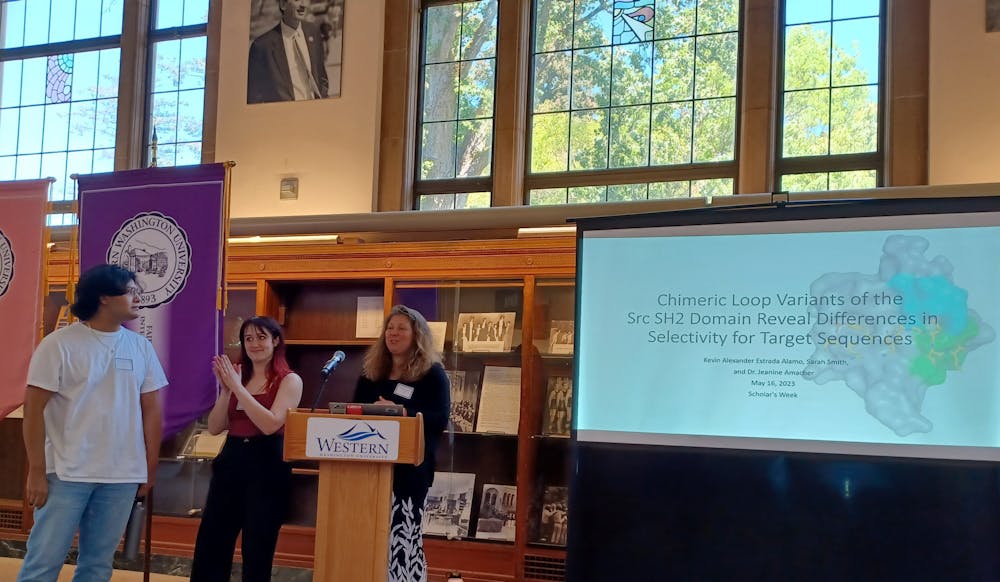Student and faculty presenters showcased their academic work at Scholars Week in the Wilson Library Reading Room at Western Washington University on May 16.
The event marked the return of Faculty/Student Group Collaborations, a Scholars Week category created in 2022 to celebrate the relationships that spawn research and creative work. While other events such as the Poster Session and Three-Minute Thesis involve individual student presenters, the group collaborations center mentorship.
“We’re all kind of equal in our input,” said Mary Hunt, a faculty presenter and assistant professor of health and human development at Western. “I make the schedule and pick the readings and things like that. But this project is because of the students that I have and input that I’ve gotten.”
Hunt and her students from the Research in Repro And Sexuality Lab outlined their intended study on the relationship between cannabis use and sexual consent. They discussed the anticipated challenges of the social stigma around the topic and interpreted qualitative data from participants.
Tasha Denton, a third-year public health student, collaborated with Hunt to design the study.
“Being a woman in STEM as well as a sex researcher who hasn’t done any presentations or anything like that before, there’s a lot of impostor syndrome,” Denton said. “Standing up there and feeling knowledgeable and feeling like I had something to teach people was a really cool feeling.”
The presenters said abundant research exists on alcohol and consent, but similar research on cannabis is scarce due to the drug’s federally illegal status. Ideas in the presentation pointed to a hope that their research addresses this gap in the knowledge of lawmakers and the public.
Associate Professor Jeanine Amacher and her student researchers presented their findings on the selectivity of peptide-binding domains such as SH2. They altered the domain to understand how to harness cellular signaling networks to inhibit cancerous cells.
“There are ways to make [chemotherapy] more specific to recognize cancer cells versus other just normal human cells,” said Kevin Alamo, a fourth-year biochemistry student who collaborated with Amacher. “That’s kind of where we need to head next is creating therapeutics that are highly specific … to then improve side effects for chemotherapies to improve quality of life.”
Amacher said she plans to get her student’s work published so it can inform cancer treatment development.
“They really did all the work,” Amacher said. “I’m kind of the brains and money behind the operation, but it’s all very collaborative. They’re the ones who actually do the pipetting and do the experiment. It’s important to me that they got to present their own data.”
Chauncey Gummere, a fourth-year public relations student on the Scholars Week Planning Committee, said the committee voted to create the Faculty/Student Group Collaborations because it realized student research was not made in a vacuum.
Gummere said Scholars Week is the largest annual event Western holds to honor academic work. The event can also offer presenters further opportunities.
“[The Career Services Center] put the word out there for employers to know that Scholars Week is happening, so employers will actually be coming and checking people’s work,” Gummere said. “You could potentially find your next job at Scholars Week.”
Mia Limmer-Lai (she/her) is one of two copy editors for The Front this quarter. She is a second-year environmental studies and journalism student at Western with a minor in honors interdisciplinary studies. In her free time, she enjoys reading books and listening to punk music. You can reach her at mianlimmerlai.thefront@gmail.com.






